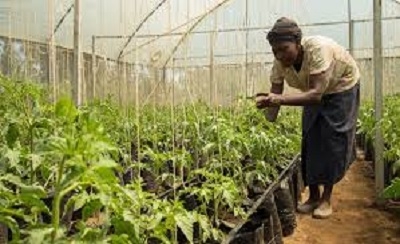
Lilongwe, 4 September, 2018 (ACBF) – There are inadequate initiatives and strategies for integrating women into agricultural programs in Africa. To achieve sustainable development, there is a need for concerted efforts to empower women in agriculture and spur transformative changes in their livelihoods, households and communities. As part of the partnership between the African Capacity Building Foundation (ACBF) and the Arab Bank for Economic Development in Africa (BADEA) towards empowerment of women in agriculture in Africa, a Policy Advocacy Forum is opened at the Sunbird Capital Hotel in Lilongwe, Malawi on 6 September 2018. The forum will bring together about 160 participants representing women farmers, leaders of women farmer cooperatives and networks, government, civil society, and research and academic institutions. The local partner for the organization of the Forum is the Civil Society Agriculture Network (CISANET) in Malawi.
According to the ACBF’s Executive Secretary, Professor Emmanuel Nnadozie, the Policy Advocacy Forum and all other interventions to be undertaken in the framework of ACBF partnership with BADEA, will contribute to the successful implementation of Agenda 2063 and ensure that Africa’s development relies on the potential of African people, especially its women and youth.
The ACBF-BADEA Empowerment of Women in Agriculture (EWA) Project seeks to promote sustainable agriculture in Africa with women at the forefront. The program aims to support women farmers to participate in viable agriculture by enhancing women farmers and their networks’ capacity to become active partners in the process of agricultural transformation on the continent.
The project is being implemented on pilot basis in three African countries, namely Malawi, Rwanda and Liberia. The forum will make specific policy recommendations for consideration by policy makers towards enhancing the role of women farmers and their networks. In addition, the recommendations will help development partners, civil society organizations, women farmer networks and other stakeholders to formulate appropriate strategies and interventions in empowering women in agriculture.
--------
Note to Editors
About the African Capacity Building Foundation (ACBF)
Established in 1991, ACBF’s mission is to build sustainable human and institutional capacity for sustainable growth, poverty reduction and economic transformation in Africa. The ultimate goal is to improve the lives and prospects of people throughout the African Continent. ACBF supports capacity development in Africa through grants, knowledge sharing and technical assistance to countries and regional and sub-regional organizations. ACBF’s approach to capacity development focuses on addressing capacity needs and gaps as well as on stakeholder ownership of interventions, project and program sustainability and synergy of interventions with other development funding institutions. For further information go to: www.acbf-pact.org.
About the Arab Bank for Economic Development in Africa (BADEA)
The Arab Bank for Economic Development in Africa (BADEA) was established pursuant to the resolution of the 6th Arab Summit Conference at Algiers (28th November 1973). The Bank began operations in March 1975. BADEA is an independent international financial institution created for the purpose of strengthening economic, financial and technical cooperation between the Arab and African regions and for the embodiment of Arab-African solidarity on foundations of equality and friendship. To achieve this end, the Bank was given a mandate to participate in financing economic development in African countries, stimulate the contribution of Arab capital to African development, and help provide the technical assistance required for the development of Africa.
About the Civil Society Agriculture Network (CISANET)
Civil Society Agriculture Network (CISANET) is a locally registered lead policy advocacy network of civil society organizations in Malawi working on agriculture and food security policy issues affecting not only the smallholder farmers but generally the poor people and their livelihoods. Policy advocacy is the central part of CISANET work. CISANET works with its members at both national and district level to share information on food security issues as well as undertake policy advocacy initiatives which affect the poor.The relevance of the experience and structure of CISANET having member organizations working with women in agriculture covering a wide geographic areas of Malawi made it a preferred partner for the implementation of EWA.
For further information contact:
Tsitsi Chakonza
Communication Unit
ACBF
Tel: +263 242 304663, 304662
Email: [email protected]





